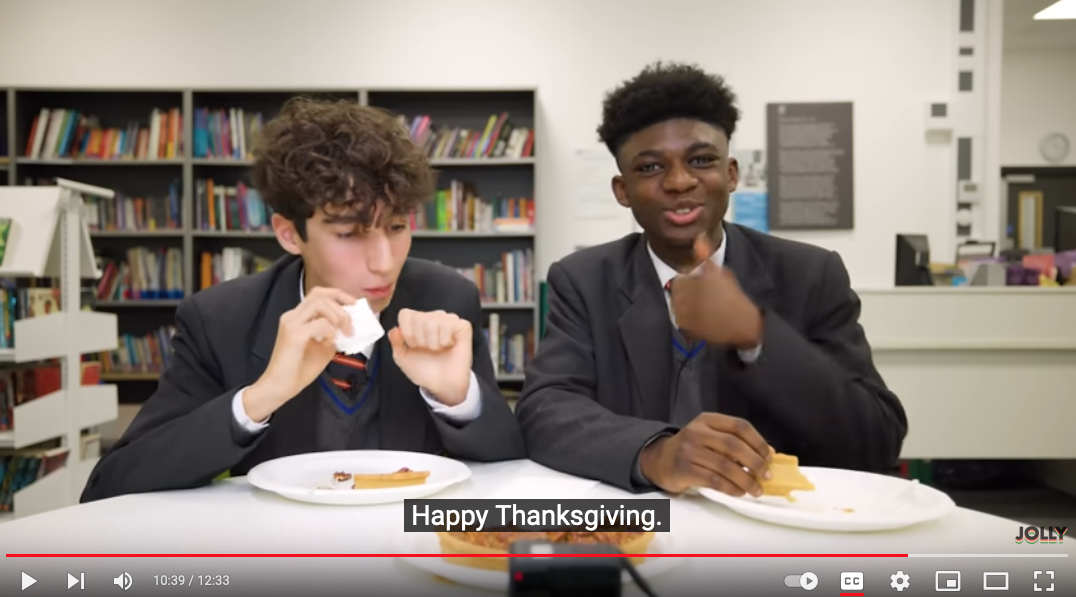
Before misinformation, disinformation, Facebook’s Cambridge Analytica fiasco, and “deep fakes” it is hard to remember the time when the internet was a (largely) uncorrupted landscape of novel, good-hearted fun.
From cat videos to laughing babies, everyone had their favorites when the internet was still young. The slow-moving genre loosely known as “Watching People Eat” has, however, undoubtedly done the most to lend the smoldering wasteland of internet “fundom” its best chance of revival. It is hard to say when this now-stalwart genre first started generating critical mass—many say it started with non-Jews eating Jewish food—but origins are not the point here. The point is, blandly put, fun on the internet. Jolly, two British YouTubers named Josh and Ollie who delight in traveling the non-English world for new food combinations, find that fun most effortlessly.
Granted, every internet video genre grows fatiguing after a while. Much of what Josh and Ollie uncover through their gastronomic travels is high on hyperbole, and decidedly lacking any sophisticated angle. Scroll through YouTube, and you quickly discover that they have shot far too many installments of the “Brits Eat Bizarre” food type. Neither of these young, though thoroughly amiable, Englishmen aspire to the insights of Anthony Bourdain. But where insight is forsaken for reaction, the duo strikes gold more often than not. Nowhere is this more evident than in the twelve-minute, thirty-three-second opus, “British Highschoolers try Thanksgiving Dinner for the First Time!”
The plates of unfamiliar fare eyed by successive pairs of uniformed British secondary students move both fast and somewhat slow, almost as if each menu item is a small bomb about to detonate. The “post-Thanksgiving sandwich,” sweet potatoes topped with marshmallows, pumpkin pie, and pecan pie are the main attractions. Topping it all off is a hearty prompt by Josh and Ollie for each student to name what they are most thankful for. Friends get the lion’s share of thanks, many for their football (read “soccer”) skills in certain playing positions. Then there is a short visit to the headmaster’s office. A cynic would say the kids featured are merely playing to the camera, but it is clear from the first dish offered that the charm on display is too spontaneous and genuine to be at all planned.
Watching the clip as an American is to be reminded, even amid an annual ritual some of us now find numbingly familiar, how unique our Thanksgiving holiday is, and oddly delicious its food, if still familiar to foreigners by other names. What we call a Thanksgiving turkey the British call a “roast dinner.” What we call dessert, they call “pudding.”
With every dish, a mood of uncertainty settles into a verdict within seconds to reveal the beating heart of why the “Watching People Eat” genre is so popular. Who does not like a good laugh at the expense of others trying something completely new and unexpected? Who does not enjoy watching those same people reach for on-the-spot explanations of why they like or dislike something?
“I don’t get it,” says one student about sweet potatoes topped with marshmallow. “But you know what? I’m not going to complain. This tastes lovely.”
“What’s a pecan?” asks another, eyeing his slice of pecan pie. “You’ve just got nuts from the local park and put syrup on it?”
The high point of laughs is when Josh and Ollie attempt to explain our nation’s annual pardoning of the Thanksgiving turkey, or in UK-speak, “the presidential turkey pardon.”
“Sounds a bit scary,” says one student, before everyone erupts into laughter at the prospect of a turkey so “tasty” that a pardon was in order.
Food, as is so often said, is the great mediator and peacemaker because we all know what it means to be hungry, and we all know the comfort of sitting down to eat with friends and family. And as is also so often said, food is culture. The joy of watching this video is the charm with which it makes our Thanksgiving food new again, even to Americans who know it year after year, every late November. If we cannot be grateful for something made new, how could we possibly be worthy of our own holiday?
